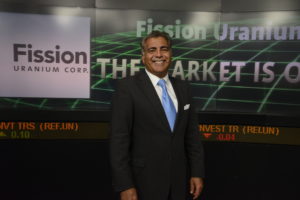Whether it’s the UK government’s bullish support for a new nuclear reactor construction program, or the recent production issues at the Olympic Dam (BHP) and Rossing (Rio Tinto) mines, there’s always something interesting happening in the nuclear energy and uranium markets.
The most interesting news I’ve come across recently, concerns China and, separately, Ukraine.
Chinese growth
Not long ago, China made headlines by announcing approval for two new reactors. They’ve already got 26 under construction but if you’re familiar with their plans, that’s just a drop in the ocean and we can expect a lot more approvals to follow over the coming years.
To quote an analyst I was speaking to at PDAC this month: there are two elephants in the room and people are watching the wrong elephant. In other words, everyone is so caught up with the question of when Japan will switch its first reactors back on (best guess is currently this summer) that they aren’t paying attention to China. Make no mistake, China’s nuclear construction program is a juggernaut. When Japan starts flipping the ‘on’ switches, it may increase stock prices as a result of positive sentiment but it won’t actually make a large, immediate difference to demand. China, however, is building reactors in such rapid succession that their need for uranium is going to gather some very serious momentum.
The Ukrainian question
My interest in an article this week on the Ukraine concerns supply-side vulnerabilities. Ukraine has the world’s eighth-largest nuclear capacity so when it comes to demand, they are a player. Unsurprisingly, Russia is Ukraine’s primary supplier of nuclear fuel. After all, the two countries share a border, Ukraine’s reactor fleet is of Russian design and construction and Russia is the largest source of secondary uranium supply.
The article draws attention to a deal that Ukraine struck with US nuclear firm, Westinghouse, back at the end of 2014 to supply uranium. It also notes that countries such as France and the Czech Republic has moved to diversify nuclear fuel supplies and the EU has now ruled that such diversification of supply is mandatory for all new nuclear plants in the EU.
Essentially, just as Fission director, Anthony Milewski warned in a blog post in May 2014, Russia’s tendency to use its position as one of Europe’s leading uranium, oil and gas suppliers as a political tool is starting to backfire. This is a country that supplies up to 40% of Europe’s enriched uranium and if the buyers are moving to reduce Russia’s role as a supplier then more pressure will be placed on traditional sources of production aka mining.
Be sure to connect with us on Twitter and LinkedIn to stay up to date with Fission news and get in touch with any questions.
Dev Randhawa
Dev Randhawa is the founding Chairman and CEO of Fission Uranium. He has won numerous awards for his work in the industry, including Northern Miner Magazine ‘Mining Person of the Year 2013’ and as part of the Fission team, Mining Journal Excellence Award 2015 for Exploration.
Disclaimer
Forward-Looking Information: Some of the posted entries on the blog may contain forward-looking statements. Please find the full disclaimer here.







